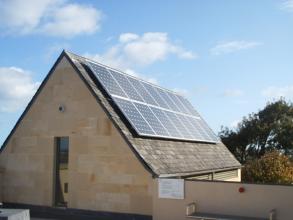You are here
All change
Lately, things have gone rather quiet in our part of the world. Our industrial journey seems to have reached the end of the line. Looking around, we see a dreary monoculture in both town and country. The protestant work ethic of “working and saving” seems to have changed to “getting and spending” - perhaps we need another ethic now? As in the Bronze Age, 4000 years ago, nation states continue to jostle with each other over resources and new technology brings new weapons.
Now Nature, too threatens our precious cities with a potential rise in sea-levels. Many of our major urban areas are at low elevations; for good reasons, as those of us who live among the hills will know. If sea level rise does happen, there will be a considerable displacement of our population into the uplands, as the Greenhouse Britain scenarios show.
The Hadley Centre's predictions for climate change by 2050 are not too alarming. There is still significant rain falling and summer temperatures are hot, but not unbearable. Many commentators believe that our region will get off lightly.
But one nagging doubt is that the loss of the Atlantic conveyor current would bring much colder, Canadian-style winters.
If we are to be spared the worst effects of climate change, then it is people we will have to deal with, rather than Nature. Our islands have a history of colonisation by people wanting new land, a new start. What do we do when the next wave comes?
Guides to Climate Change in North Britain
Greenhouse Britain
http://greenhousebritain.greenmuseum.org/downloads/
Hadley Centre
http://www.metoffice.gov.uk/climatechange/guide/ukcp/map/
Problems in the Atlantic?
http://en.wikipedia.org/wiki/Shutdown_of_thermohaline_circulation
It is little use complaining that we have got ourselves into a mess. Sooner or later we must clear up the mess, and move on. In working out what to do, I like to draw on the positive characteristics of our ancestors. How did we achieve the wonders of the modern age? Through their ingenuity, foresight, hard work and canniness. Exactly those qualities that live on in us.
We can claim that the Industrial Revolution and the Age of Globalisation began in our region. Perhaps we can take some responsibility for that, and sow the seeds of a further Enlightenment to occupy the hands and minds of our expanding population.
We have had our Empire, been there, done that; now it's time to try something else. As old certainties dissolve, we can turn our industry towards living peaceably in this wonderful landscape.
